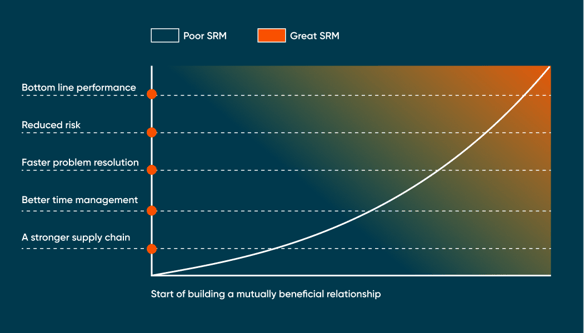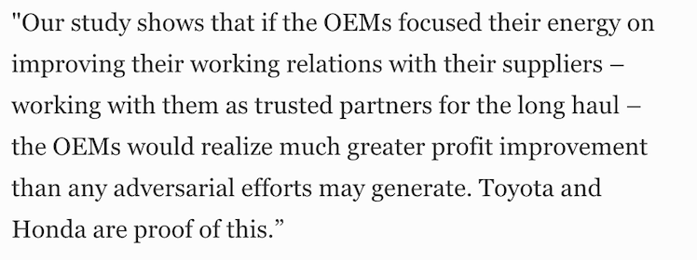
- Supplier relationship management (SRM) is increasingly becoming a priority for procurement
teams.
- It focuses on building a mutually beneficial relationship between you, as buyer, and your key suppliers.
- This can lead to valuable cost savings, reduced administration, greater supply chain resilience and opportunities to innovate.
The changing nature of buyer-supplier relationships
If you own or work for a company providing any kind of products or services, you’ll already be prioritising customer relations because you know the business value of doing so, both financially and reputationally.
However, it’s a good idea to place just as much value, in the other direction, to the relationships you have with your primary suppliers.
Traditionally, procurement processes have often taken a one-sided approach, the aim being to pressure suppliers to deliver at the lowest possible price point.
Supplier relationship management - hereafter abbreviated to SRM - is about changing that approach into one in which suppliers are treated not just as sellers to be bargained down on price, but as valued business collaborators. Gartner articulates SRM as “a business initiative that many companies undertake to build mutually beneficial relationships with suppliers.”
This approach isn’t new, having its origins in 1983 when Peter Kraljic, a director at McKinsey, published a Harvard Business Review article titled Purchasing Must Become Supply Management - but the supply chain vulnerabilities exposed by the 2020 - 2021 global pandemic pushed SRM to the top of the agenda at many board meetings, because they underscored the importance of uninterrupted supply lines.
For many companies, SRM is no longer seen as a “soft” corporate philosophy but as a practical and beneficial business strategy.
How can a greater focus on SRM benefit your business?
SRM underpins the key factors procurement managers and teams usually prioritise - including cost control, risk mitigation, problem-solving, processes and supply chain dependability.

1. Better bottom line performance
The old way of dealing with suppliers - strong-arming them to come down to the lowest possible price - may work for cost reduction in the short term, but research by Detroit-based academic and supplier relations consultant John Henke and fellow researcher Sengun Yeniyurt suggests that sustained investment in SRM can have a long-term benefit on revenue that far outweighs immediate price concessions.
In fact, price concessions can even have a negative financial impact. One leading auto company had to recall millions of vehicles due to defective starter switches. These switches were installed because of the company's demand that its suppliers produce their products at Chinese price levels. In examining a leading automotive manufacturer in the USA, Henke’s 2014 study found that it had missed out on an estimated USD $24 billion in potential income over the course of 12 years, as a result of poor supplier relations.
Based on his research, Henke argued that “the better the relations with suppliers, the more they contribute to customer profitability” and that the value of non-price benefits, such as the sharing of supplier innovation, exceeded that of supplier price concessions by an average of 4-5 times.
The study has been widely discussed and quoted.

In an interview with SpendMatters, Henke said, “… adversarial cost reduction approaches appear to get quick results. It's like hitting your dog when you want it to do something - you get an instant response, but it isn't the way to get good long-term results. Sustainable supplier contributions to a company's profits will occur only from strong supplier relations.”
Henke relied on 20 years of research and over 30 000 data points to support his findings.
2. Reduced risk
SRM fosters risk management at the very beginning of a collaboration with a new supplier, when the buyer should assess a potential supplier against a risk assessment checklist, rather than focusing purely on the pricing levels it will offer.
Risk management is ongoing: once the business relationship is active, supplier and buyer should collaborate to compile future forecasts, workshop contingency plans for potential problems and identify areas of weakness in their shared supply line.
This may involve going further up the supply chain, to analyse potential delivery risks from other suppliers that provide the components the primary supplier needs, to fulfil the buyer’s orders.
3. Faster problem resolution
If the buyer nurtures the relationships with its key suppliers and encourages regular and transparent communication, problems impeding the availability, quality or delivery of products can be more speedily resolved.
On the other hand, if a supplier does not believe it has an open and positive relationship with a buyer, it may conceal problems it is having, instead of revealing them to the buyer.
4. Better time management
By forging long-term, healthy business relationships with a select group of key suppliers, procurement teams can implement an administration-light and smooth process for purchasing that is fast, consistent and reliable.
This enables them to spend less time solving supplier issues and more time focusing on value-adding strategic procurement.
5. A stronger supply chain
COVID-19 disrupted global supply chains in unexpected ways and highlighted the value of SRM. For example, when many organisations started scrambling to procure personal protective equipment (PPE), they experienced problems ranging from substandard equipment and delivery failures to unexpected price hikes and surcharges.
Meanwhile, one leading healthcare company relied on “supplier relationships and textbook SRM” to secure and grow the supplies it needed.
In times of crisis, from strikes and recessions to global pandemics, it’s valuable to have loyal suppliers that will be prepared to go the extra mile for you when necessary. Prioritising SRM ensures that you should always have in place a reliable supply chain that you can count on to deliver.
Learn more on how to: Prosper From Supplier Relationship Management